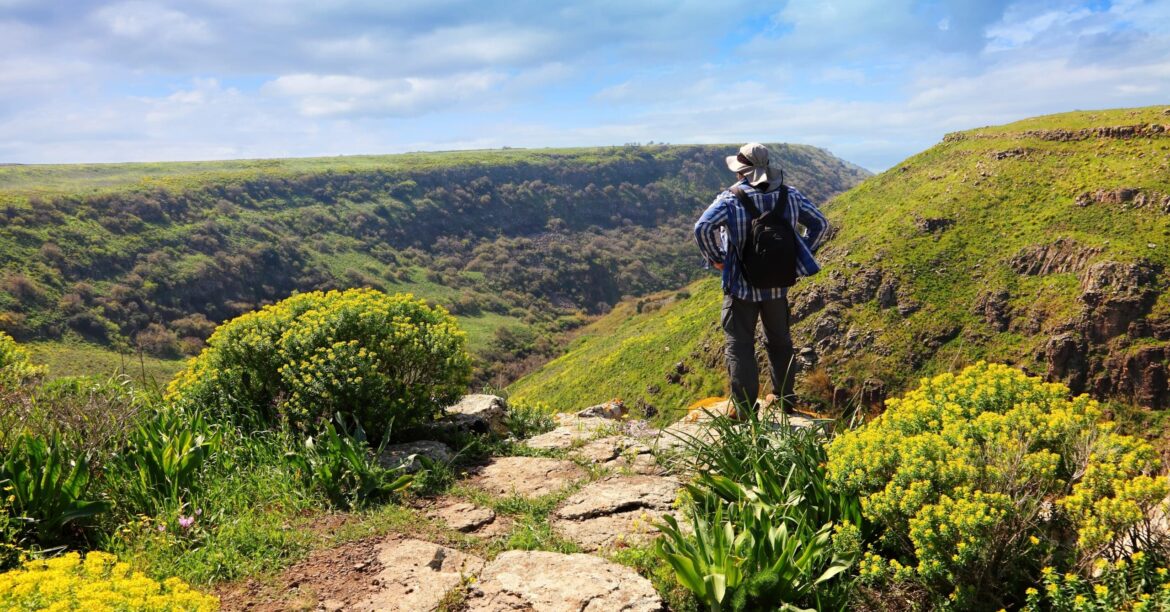In the aftermath of the Hamas massacre on October 7, 2023, and the ensuing ongoing conflict, Israel has been experiencing what experts call its largest mental health crisis ever.
An estimated 3 million Israelis have been affected mentally by the war, including thousands of teens displaced from their homes near Gaza and the northern border.
The Society for Protection of Nature in Israel (SPNI) has responded with an innovative program called “Resilience Journeys,” which capitalizes on Israel’s abundance of stunning natural landscapes to help traumatized teenagers heal and build resilience.
“We know from our own lived experience that being in nature is very good for you,” explains SPNI Deputy Director of Development Lawrence Kasmir. “It makes you feel better, helps you breathe more easily, and helps reduce stress.”
Kasmir points out that this approach, often called ecotherapy, has strong scientific backing. The concept gained popularity in Japan in the 1980s as “forest bathing” — basically, immersing yourself in a natural environment to clear out your pent-up mental and emotional gunk.
SPNI has adapted that core principle to address the needs of Israeli kids.
A holistic journey
Resilience Journeys consists of four-day immersive experiences in natural settings across Israel, with locations including the Eilat Mountains, Judean Desert and Carmel area.
Each journey begins with a preparatory meeting and concludes with a follow-up session.
Naama Shalem, manager of the Resilience Journeys project, has been working for SPNI for 10 years and spent time working in hospitals as a physiotherapist following October 7. She tells ISRAEL21c that what makes these trips unique is their intentional design.
Each teen is assigned different roles throughout the journey — like cooking breakfast or doing video interviews of their peers. The latter task is part of a crucial and empowering aspect of the program: At the end of the program, participants are shown a self-made documentary that details their journey physically and emotionally.
“Teenagers don’t talk well to adults, especially if we ask them questions,” Shalem observes. “But when they talk to each other, they allow themselves to ask questions that might be too personal if we asked them, and they open up more.”
As well as the rotating roles, Shalem explains that every day has a specific pedagogical aim. “For example, the second day is a challenge day with a longer trail. We want participants to reach their limits and see that they can go beyond them.”
On the third day, teens choose their own challenges — whether a demanding hike or learning survival skills. “When they choose the challenge themselves, their ability to cope increases significantly,” notes Shalem. “They end up feeling empowered and proud of themselves.”
It’s working
It’s still relatively early in the program’s run, but an initial evaluation has been promising.
“Four out of five participants reported using the skills they developed during the program in their daily lives afterward,” Kasmir shares. “Four out of five is not enough for us, but for a pilot program, that’s a solid start.”
The impact can be seen in individual stories as well. Shalem recounts a recent journey with a diverse group of evacuated teens who were initially resistant to participating.
“The first two days were intense,” she recalls. “But by the third day, 85 percent chose the more challenging trail option. They were committed, navigating on their own, and limiting breaks because they wanted to reach their goal.”
When they finally reached a spring at the end of the trail, “They went into the water and suddenly didn’t care that there were no showers or that their phones were unavailable,” Shalem says. “They were with each other, laughing, talking, taking pictures.
“And at the end of this day … they were so overwhelmed, and so proud, they were clapping for themselves. It was amazing to give them the chance to choose and show them that they could do it.”
Looking Ahead
Since its inception shortly after October 7, SPNI’s broader ecotherapy initiative, called Nature Heals, has helped over 110,000 people across Israel.
The Resilience Journeys project specifically has reached about 300 teens so far — including an initial run with participants from Majdal Shams, a northern Druze community that was devastated by a terrorist rocket strike last year.
SPNI has plans to expand Resilience Journeys to reach 700 to 800 participants next year. The organization is also developing variations of the program for younger children (grades 4-5) and discharged combat soldiers.
Part of that expansion includes finding funding. Currently, the program is supported by the Jewish Federations of North America and crowdfunding initiatives, but the goal is for the Ministry of Education to adopt Resilience Journeys as a national program.
“ We think that every kid in Israel was affected in this year and a half of war, and we really wanted to spread widely and to reach other populations,” Shalem emphasizes.
“We want to reach younger kids as well, and even the cities and the villages that weren’t directly involved in the war; they were still affected. They were still having sirens and running to safe rooms. They were still watching the news and being traumatized, even if they were farther away,” she points out.
“We really want to give every kid in Israel the opportunity to go through these journeys because we see how significant the effects are, and we really think they can benefit from it.”
After 70 years of conserving Israel’s natural landscapes, SPNI is now leveraging these protected areas to help heal the nation’s youth. As Kasmir puts it, “We are the Society for the Protection of Nature in Israel, and now we’re using nature in Israel to protect society.”
Originally posted at israel21c.org

